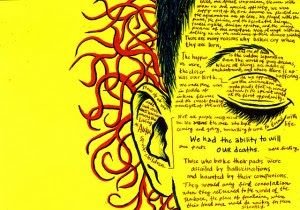All the World's a Stage by William Shakespeare (summary, analysis, questions answers)
Themes
In ‘All the world’s a stage’ Shakespeare discusses the futility of humanity’s place in the world. He explores themes of time, aging, memory, and the purpose of life. Through the poem’s central conceit, that everyone is simply a player in a larger game that they have no control over, he brings the themes together. Shakespeare takes the reader through the stages of life, starting with infancy and childhood and ending up with an old man who’s been a lover, a soldier, and a judge. The “man” dies after reverting back to a state that’s close to childhood and infancy.
Tone and Mood
In’ All the world’s a stage’ Shakespeare creates a somber and
depressing mood through the simple breakdown of life, success, love, and death.
The beauties of life are compiled into a short monologue that’s over almost as
soon as it began. With this, the reader is left to consider their own life and
what “stage” they’re in now. The speaker knows that this is the way the world
is, everyone listening to his words is all going to end up back where they started
as children and there’s no way to change that fact.
Literary Devices
Shakespeare makes use of several literary devices in ‘All the
World’s A Stage.’ Some are:
Simile: ‘creeping like a snail’; ‘soldier…
bearded like the pard’; etc.
Metaphor: the entire poem itself is more like
symbolism; men and women are portrayed as players whereas life is portrayed as
the stage.
Repetition: another figure of speech used in this poem; words like sans, age, etc. are repeated.
Question
Describe the various stages of a human’s life picturized in the poem “All the World’s a Stage.”
The first stage according to the Bard is a crying infant who
pukes in the nurse's arms. The second role played by a man is that of a whining
schoolboy who hates going to school, but because he is forced to, he goes
there unwillingly carrying a big burden on his back. In the third stage, man
becomes a lover, “sighing like a furnace” and singing sad love songs thinking
about his beloved all the while. In the fourth stage, he is a patriotic soldier,
dedicating himself to protecting his country. In the fifth role he plays, man
becomes a Judge and is bent on upholding truth and justice, having sound wisdom
in the different things of life. In the sixth stage, he begins to get older. He
becomes leaner, loses his strength, vitality, and his eyesight too, and is dependent
on his spectacles. The seventh stage, which is the final stage, is pretty much
like the first stage, which Shakespeare describes as “second childhood” where
man becomes so fragile, loses his eyesight completely, is ‘toothless' and
without taste and without everything, just like the childhood. But one major
difference is, he is totally alone and isolated in his “second childhood” when
compared to his first.




Comments
Post a Comment